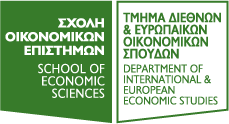International Economics
Number of credits allocated: 6 ECTS Credits
Objective of the course (expected learning outcomes and competences to be acquired)
The purpose of the course is to introduce students to the subject of international economics, by focusing on the connection between the analytical tools and theories of the subject and events in the world economy.Among the topics covered in the course are: absolute and comparative advantage; determination of relative prices; e gains from trade; effects of productivity changes on domestic and foreign welfare; international trade and income distribution; political economy of factor movements, trade policy under various market structures; political economy of trade policy; preferential trading agreements; national income accounting and the balance of payments; the current account and foreign indebtedness; money, interest rates and exchange rates; effectiveness of macroeconomic policies; comparison of exchange rate regimes; balance of payments crises and capital flight; macroeconomic policy goals in the open economy: internal and external balance; and international macroeconomic policy coordination.
Students are expected to be able to analyse the main determinants of the pattern of international trade flows, the effects of these trade flows, as well as the main instruments and consequences of government intervention (i.e. tariffs, subsidies) in international trade. Students are also expected to be able to understand the impact of national macroeconomic policies on output, employment, and the current account of the balance of payments, as well as the operation and consequences of alternative exchange rate regimes.
Prerequisites: Basic knowledge of Microeconomics and Macroeconomics
COURSE CONTENTS
- Introduction and Overview of International Trade
- Labor Productivity, Absolute and Comparative Advantage
- Specific Factors of Production and Income Distribution
- External Economies of Scale and International Division of Production
- Exports, Outsourcing, and Multinational Enterprises
- The instruments of Trade Policy
- Exchange Rates and the Foreign Exchange Market
- Prices and Long-Term Exchange Rates
- Output and Short-Term Exchange Rates
- Fixed Exchange Rates and Intervention in the Foreign Exchange Market
Recommended reading
- Krugman, P.R., Obstfeld, M. και Melitz, M. (2023) Διεθνής Οικονομική: Θεωρία και πολιτική (5η βελτιωμένη έκδοση, ΚΡΙΤΙΚΗ)
- Gerber, (2018) Διεθνής Οικονομική, Εκδόσεις Broken Hill Publishers
Teaching methods : Traditional lectures-based format
Assessment methods : Final written exam
Language of instruction : Greek – English





